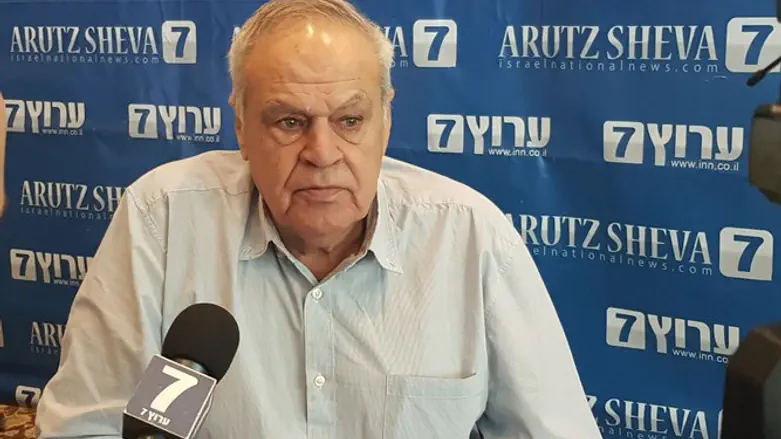
Roni Daniel, the senior military commentator for Channel 2, is convinced that no one in the defense establishment has the will to halt the progress of religious Zionism to the top IDF command positions.
"It's just not true," Daniel said in an interview with Arutz Sheva during the journalists’ conference in Eilat. "The considerations about who to advance are practical as far as I can tell. Ofek Buchris would definitely have been a general in the IDF by now were it not for the incident. There are many more names. The army does not ask what you wear under the helmet - good people, with kippot and without kippot, to each his own."
"I think that the army enjoys the service of religious Zionists. They are worthy people, worthy officers and worthy fighters. It infuriates me every time there are those who try to inflame this issue."
"As far as I know, in the near future there will be at least two brigadier generals with kippot who will go on to become major generals.”
During the expulsion from Gush Katif, you slammed expressions that were heard against IDF soldiers. Does the army have to expel brothers from their homes?
"The army works for the government - not the other way around. There is no other body in this country capable of carrying out such a difficult operation emotionally, physically and mentally. So they threw it on the army, and it has to carry out these orders. ‘Their brothers’ is a nice slogan. The army exempted all the soldiers who had relatives in Gush Katif. The awareness that you are evicting a relative - it is clear that one should not put it on a young man. "
"It was a difficult event, first of all, of course, for the residents of Gush Katif, but it was also difficult for the soldiers. There is no one else in this country who would do it, unfortunately. I think there was no escaping it. It's bad - but there was no other choice."
Looking back, was the expulsion from Gush Katif justified?
"Unfortunately, yes. I'm not sure that those who are talking about Gush Katif today were there. Gush Katif was imprisoned between Khan Yunis and Muasi. I walked around there a lot and had many friends there, I did not see a chance that it would survive. Also, according to the Jewish tradition, Gush Katif does not belong to the Land of Israel, it is not the land of our forefathers."
You don’t think evacuating Jewish communities could increase terrorism?
"Qassams were also in Gush Katif, soldiers and civilians were killed on the way to their homes in Gush Katif more than they are being killed today on the dangerous roads of Judea and Samaria. It was a move that was right. By the way, all the risks were foreseen. It was clear that [the eviction] was possible."
Quite a few people in the security field say that it was a mistake.
"I do not think so, it was a mistake to do it without creating proper compensation mechanisms - but that’s from a tactical perspective. In principle - don’t bite off more than you can chew. Enough already, we can’t control many areas, settle many places and be weak everywhere."
We are hearing about women in combat these days and there is opposition in the religious public, as well as elsewhere. Israeli hero Avigdor Kahalani says to women - 'Do you really want to serve in a tank?' What do you think?
“They are also being intentionally misleading here. I am not sure that Kahalani understands what they are doing. I think that this discourse has lost its factual accuracy. Women are soldiers in the IDF, and I am happy to see the statistics that religious Zionist girls are enlisting more.”
"We never planned to have a tank shared by men and women. In advance they talked about the possibility of a tank for women. I really appreciate them, I see them in the different units, and it’s exceptional. The tanks in which women are supposed to serve are not tanks that are supposed to cross a border but rather protect the borders.”
"It must be understood that women serving in these places also frees soldiers up for more massive training exercises. It helps other fighters to train properly."
"Here, too, there was a premature cry stemming from a lack of understanding over what it meant. They did a pilot with 15 teenage girls to see what it would be like. They need to be recruited to a place that does not harm their health or the quality of their lives. "
So you're actually giving them leniencies - reducing the weight that another soldier carries.
"Certainly. Of course, when you're in a patrol car, you do not have to carry all 15 cartridges, you can make do with four, and it will be okay. This is an initial trial, and it seems to me that the army has a very serious approach to examining things, and I am happy that the religious Zionist girls are enlisting in the IDF.
"The army is obligated to allow them to maintain their religious lifestyle and must show respect. I think the army does it. Let them enlist and when they finish their service, they will tell you how good it was."